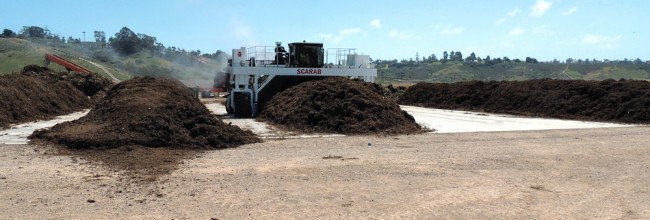BioCycle May 2013, Vol. 54, No. 5, p.12
Oceanside, California:“New” Site For Yard Trimmings Composter
Operations got underway at Agri Service, Inc.’s newly relocated El Corazon Compost Facility not long before BioCycle’s 27th Annual West Coast Conference in San Diego in April. “We had the electricity connected about a week before the event,” says Mary Matava, president of Agri Service, who started her composting company in 1995. The property — for both the new facility and the original — is leased from the City of Oceanside, which is building soccer fields on the acreage just vacated by Agri Service. Residential yard trimmings collected curbside in Oceanside, as well as green waste from commercial landscapers, had been composted in windrows. The new facility is designed around a forced positive aeration system provided by Engineered Compost Systems. “We have a 12-acre site in total, with two half-acre composting pads that essentially mirror each other on each side of a central curing pad,” explains Matava. “As material is composted, it is moved toward the central curing pad.” There are 10 aeration zones on each pad. Windrows are turned with a new SCARAB that is fitted with a hood on the back that creates a furrow as it goes down the row, which facilitates adding moisture to the piles. Agri Service utilizes a Vermeer tub grinder and has a Rotochopper Go-Bagger for filling orders for bagged products. Also new to the facility is an electric-powered Doppstadt sorting station to remove contaminants from the curbside-collected yard trimmings. The site is permitted to compost source separated food waste, but wasn’t receiving any loads at the time of the BioCycle Conference tour. The new facility also features refurbished cargo shipping containers that are used for office space, a kitchen and soon, a gym for employees. Green roofs are being installed on
Toronto, Ontario: Compost Week Celebration Kicks Off With Amending Urban Soil
A few dozen downtown Toronto workers took a break from their regular jobs on Monday, May 6, to don aerating sandals, pick up pitch forks and help get a down-trodden, compacted lawn in a hidden garden near Bloor and Bay Streets ready for summer. The courtyard garden was the scene of a special gardening event hosted by the Compost Council of Canada to celebrate International Compost Awareness Week. Guests took part in a demonstration of how to amend compacted soil to prepare it for planting — aerating it and sprinkling it with compost and mulch. In addition, they helped staff at the office building plant flowers, herbs and vegetables in concrete containers surrounding the lawn.
Environmental Commissioner of Ontario, Gord Miller, took his turn at turning the soil, stressing that providing the soil with organic matter is important “not only to our food supply, but to our water, air, climate, biodiversity and economy,” he said. “There is a tremendous need to extend the word. We have kind of strayed away from composting but need to get back to it, showing people how to feed the soil without chemicals. Also, well-aggregated soil is less prone to compaction.” Gord, appointed by the Legislative Assembly, is tasked with monitoring and reporting on compliance with the Environmental Bill of Rights, and the government’s success in reducing greenhouse gas emissions and in achieving greater energy conservation in Ontario. Other guests at the ICAW event included the Master Gardeners of Ontario, Toronto Master Gardeners, Landscape Ontario Horticultural Trades Association and the Canderel Group of Companies, a real-estate company. The event was designed to let gardeners know that as they gear up for this year’s gardening season, the secret to their growing success will depend on the quality of the soil — which is greatly enhanced with compost.
Facilities
Bethesda, Maryland: USCC Issues Position On Persistent Herbicides
The US Composting Council (USCC) recently released a position paper on compost and persistent herbicides. “The USCC calls on chemical manufacturers to withdraw herbicides known to persist in soil and compost with phytotoxic plant effects and to take responsibility for the damage these persistent herbicides cause, and [calls] on the US Environmental Protection Agency (EPA) and state agencies to take immediate and decisive action to prevent further environmental and financial damage,” states the Council. Its 7-page position paper summarizes what persistent herbicides are and how they contaminate compost and provides a history of the impacts to the composting industry over the past decade. In the section about the ineffectiveness of labeling requirements, the paper states that “even if herbicide applicators are provided with clear and accurate instructions on the product’s warning label, there is still a long chain of communication that must be followed from application personnel to land owners, harvesters of plant residuals, brokers, processors, distributors, resellers, retail customer (farmers), haulers and finally compost facilities in order to prevent contaminated feedstocks from being received. It is virtually impossible to ensure that the integrity of this chain of communication will be maintained.”
The final section of the paper, “Time For Action,” lists the steps that need to happen in order to protect compost manufacturers and users of their products. For the US EPA these include: Revoke the registration of all herbicides known to persist in compost at levels that are toxic to plants and require they be removed from the market; Develop a universal testing method for all persistent herbicides; Change the registration process for herbicides to require an evaluation of compostability and persistence in compost. For herbicide manufacturers, action items include being required to provide results of third party peer-reviewed research that demonstrates no adverse impacts of herbicides on plant growth following the composting process; taking financial responsibility for damages as well as needed laboratory testing; and immediately stop marketing and distributing persistent herbicides that render compost toxic to plants. The position paper can be downloaded at www.compostingcouncil.org.











